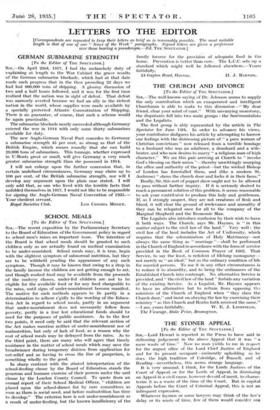THE CHURCH AND DIVORCE
[To the Editor of THE SPECTATOR.]
SIR,—The well-known saying of Dr. Johnson seems to supply the only contribution which an exasperated and intelligent Churchman is able to make to this discussion—" My dear friend, clear your mind of cant." With unvarying monotony, the disputants fall into two main groups : the Sentimentalists and the Legalists.
The first group is ably represented by the article in The Spectator for June 14th. In order to advance his views, your contributor disfigures his article by attempting to harrow Our feelings with the distressing picture of " a pure woman of Christian convictions " now released from a terrible bondage to a husband who was an adulterer, a drunkard and a wife- beater, and who now desires to marry " a religious man of high character." We see this pair arriving at Church to " invoke God's blessing on their union "—thereby unwittingly usurping the office and authority of the priest—but the wicked Bishop of London has forestalled them, and (like a modern St. Ambrose) " slams the church door and locks it in their faces."
Really, Sir, this sort of puppet show ought not to be allowed to pass without further inquiry. If it is seriously desired to reach a permanent solution of this problem, it seems reasonable to ask your contributor to produce this lady and gentleman. If, as I strongly suspect, they are not creatures of flesh and blood, it will clear the ground of irrelevance and unreality if they can be relegated once for all to the company of the Marginal Shepherd and the Economic Man.
The Legalists also introduce confusion by their wish to have it both ways. The Church, says Mr. Haynes, is " in this matter subject to the civil law of the land." Very well : the .civil law of the land includes the Act of Uniformity, which requires that the solemnization of Holy Matrimony—not always the same thing as " marriage "—shall be performed in the Church of England in accordance with the form of service provided in the Book of Common Prayer of 1662. That Service, to say the least, is redolent of lifelong monogamy— not merely as " an ideal," but as the ordinary condition of life for married persons. To use it in any other circumstances is to reduce it to absurdity, and to bring the ordinances of the Established Church into contempt. No alternative Service is provided, and " the civil law of the land " forbids any variation of the existing Service. As a Legalist, Mr. Haynes appears to have no alternative but to refrain from opposing thz ministers of the Church of England when " they slam the Church door," and insist on obeying the law by exercising their ministry " as this Church and Realm hath received the same."






































 Previous page
Previous page